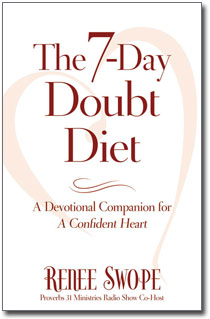Morning
"God said to Jonah, Doest thou well to be angry?"
Jonah 4:9
Anger is not always or necessarily sinful, but it has such a tendency to run wild that whenever it displays itself, we should be quick to question its character, with this enquiry, "Doest thou well to be angry?" It may be that we can answer, "YES." Very frequently anger is the madman's firebrand, but sometimes it is Elijah's fire from heaven. We do well when we are angry with sin, because of the wrong which it commits against our good and gracious God; or with ourselves because we remain so foolish after so much divine instruction; or with others when the sole cause of anger is the evil which they do. He who is not angry at transgression becomes a partaker in it. Sin is a loathsome and hateful thing, and no renewed heart can patiently endure it. God himself is angry with the wicked every day, and it is written in His Word, "Ye that love the Lord, hate evil." Far more frequently it is to be feared that our anger is not commendable or even justifiable, and then we must answer, "NO." Why should we be fretful with children, passionate with servants, and wrathful with companions? Is such anger honourable to our Christian profession, or glorifying to God? Is it not the old evil heart seeking to gain dominion, and should we not resist it with all the might of our newborn nature? Many professors give way to temper as though it were useless to attempt resistance; but let the believer remember that he must be a conqueror in every point, or else he cannot be crowned. If we cannot control our tempers, what has grace done for us? Some one told Mr. Jay that grace was often grafted on a crab-stump. "Yes," said he, "but the fruit will not be crabs." We must not make natural infirmity an excuse for sin, but we must fly to the cross and pray the Lord to crucify our tempers, and renew us in gentleness and meekness after His own image.
Evening
"When I cry unto thee, then shall mine enemies turn back: this I know; for God is for me."
Psalm 56:9
It is impossible for any human speech to express the full meaning of this delightful phrase, "God is for me." He was "for us" before the worlds were made; he was "for us," or he would not have given his well-beloved son; he was "for us" when he smote the Only-begotten, and laid the full weight of his wrath upon him--he was "for us," though he was against him; he was "for us," when we were ruined in the fall--he loved us notwithstanding all; he was "for us," when we were rebels against him, and with a high hand were bidding him defiance; he was "for us," or he would not have brought us humbly to seek his face. He has been "for us" in many struggles; we have been summoned to encounter hosts of dangers; we have been assailed by temptations from without and within--how could we have remained unharmed to this hour if he had not been "for us"? He is "for us," with all the infinity of his being; with all the omnipotence of his love; with all the infallibility of his wisdom; arrayed in all his divine attributes, he is "for us,"--eternally and immutably "for us"; "for us" when yon blue skies shall be rolled up like a worn out vesture; "for us" throughout eternity. And because he is "for us," the voice of prayer will always ensure his help. "When I cry unto thee, then shall mine enemies be turned back." This is no uncertain hope, but a well grounded assurance--"this I know." I will direct my prayer unto thee, and will look up for the answer, assured that it will come, and that mine enemies shall be defeated, "for God is for me." O believer, how happy art thou with the King of kings on thy side! How safe with such a Protector! How sure thy cause pleaded by such an Advocate! If God be for thee, who can be against thee?
Belshazzar
[Bĕlshăz'zar] - bel protect the king orthe lord's leader. The son of Nebuchadnezzar and last of the kings of Babylon (Dan. 5; 7:1; 8:1).
The Man Whose Sacrilege Brought Judgment
The story of King Belshazzar is a short one. He bursts upon the stage, then disappears. All we know about him is told in one brief chapter. What we do know about Belshazzar is that he made a great feast to which a thousand of his lords were invited and that they drank out of the vessels of gold and silver taken from the house of God as they toasted their heathen gods. Drunkenness was a prevailing vice in all ranks of the Babylonians. Belshazzar, who feared neither God nor man, manifested his vanity, profaneness and pride in the sacrilegious use of the holy vessels, and in the midst of the drunken orgy, a hidden hand writing out mysterious words interrupted their godless mirth.
Although he could not decipher the writing on the wall, Belshazzar's conscience somehow interpreted the words over against the candlestick. Terror gripped him because he felt the message spelled his doom. His own wise men failed to read the writing, so Daniel was brought in and informed the king of its significance, and that night Belshazzar, king of Babylon, was slain. The army of Darius ransacked the palace and quickly mingled the king's blood with the wine in the banqueting hall.
Today's reading: Psalm 7-9, Acts 18 (NIV)
View today's reading on Bible GatewayToday's Old Testament reading: Psalm 7-9
A shiggaion of David, which he sang to the LORD concerning Cush, a Benjamite.
1 LORD my God, I take refuge in you;
save and deliver me from all who pursue me,
2 or they will tear me apart like a lion
and rip me to pieces with no one to rescue me.
and there is guilt on my hands-
4 if I have repaid my ally with evil
or without cause have robbed my foe-
5 then let my enemy pursue and overtake me;
let him trample my life to the ground
and make me sleep in the dust....
...read the rest on Bible Gateway
Today's New Testament reading: Acts 18
In Corinth
1 After this, Paul left Athens and went to Corinth. 2 There he met a Jew named Aquila, a native of Pontus, who had recently come from Italy with his wife Priscilla, because Claudius had ordered all Jews to leave Rome. Paul went to see them, 3 and because he was a tentmaker as they were, he stayed and worked with them. 4 Every Sabbath he reasoned in the synagogue, trying to persuade Jews and Greeks.
5 When Silas and Timothy came from Macedonia, Paul devoted himself exclusively to preaching, testifying to the Jews that Jesus was the Messiah. 6 But when they opposed Paul and became abusive, he shook out his clothes in protest and said to them, "Your blood be on your own heads! I am innocent of it. From now on I will go to the Gentiles."
| ||||||
|
| ||||||||
|
Are you ready to lose the weight of self-doubt?
Join Proverbs 31 Ministries and Renee Swope on...

 | Sign up for The 7-day Doubt Diet and receive a week's worth ofFREE devotions from Renee Swope's highly anticipated book, A Confident Heart. Over 6000 women have already completed it and their stories are amazing! Filled with personal insights, powerful promises, practical applications and daily scripture-based prayers, the 7-day Doubt Diet will show you how to replace a lack of self-confidence with lasting God-confidence! To find out how you can lose the weight of self-doubt and gain a confident heart, click here. |
To sign up, visit www.ReneeSwope.com
And be sure to invite friends, co-workers, neighbors and family to join you.Here is an easy invitation to share via email, Twitter, Facebook or on your blog: Join me in losing the weight of self-doubt! Renee Swope, from Proverbs 31 Ministries is offering a FREE "7-day Doubt Diet." Just click here to enter your information in her sidebar, and you'll receive a week's worth of devotions from her upcoming book, A Confident Heart. Let me know if you sign up so we encourage one another along the way.




No comments:
Post a Comment